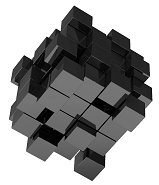 |

|
Content Owner: Herman Rutten | ||||
Summary
1 Replica (2N)
+ Hardware RAID (5, 6 or 60)
+ Hardware RAID (5, 6 or 60)
Details
HPE SimpliVity 380 uses replicas to protect data within the cluster. In addition, hardware RAID is implemented to enhance the robustness of individual nodes.
Replicas+Hardware RAID: Before any write is acknowledged to the host, it is synchronously replicated on a designated partner node. This means that with 2N one instance of data that is written is stored on the local node and another instance of that data is stored on the designated partner node in the cluster. When a physical node fails, VMs need to be restarted and data is read from the partner node instead. Given the high level of redundancy within and across nodes, the desire to reduce unnecessary I/O, and the fact that most node outages are easily recoverable, node level redundancy is re-established based on a user initiated action.
The hardware RAID level that is applied depends on drive count in an individual node:
2 drives = RAID1
4-5 drives = RAID5
8-12 drives = RAID6
14-20 drives = RAID60 (2 per RAID6 set)
Replicas+Hardware RAID: Before any write is acknowledged to the host, it is synchronously replicated on a designated partner node. This means that with 2N one instance of data that is written is stored on the local node and another instance of that data is stored on the designated partner node in the cluster. When a physical node fails, VMs need to be restarted and data is read from the partner node instead. Given the high level of redundancy within and across nodes, the desire to reduce unnecessary I/O, and the fact that most node outages are easily recoverable, node level redundancy is re-established based on a user initiated action.
The hardware RAID level that is applied depends on drive count in an individual node:
2 drives = RAID1
4-5 drives = RAID5
8-12 drives = RAID6
14-20 drives = RAID60 (2 per RAID6 set)
